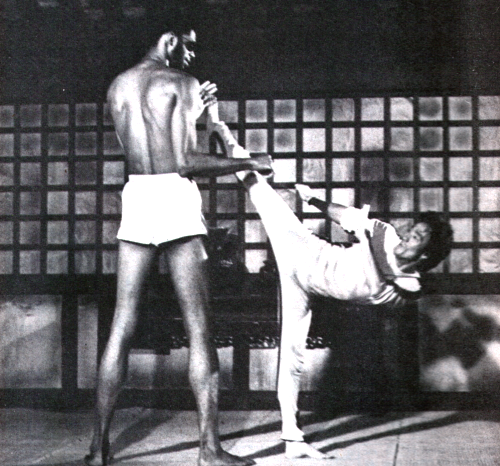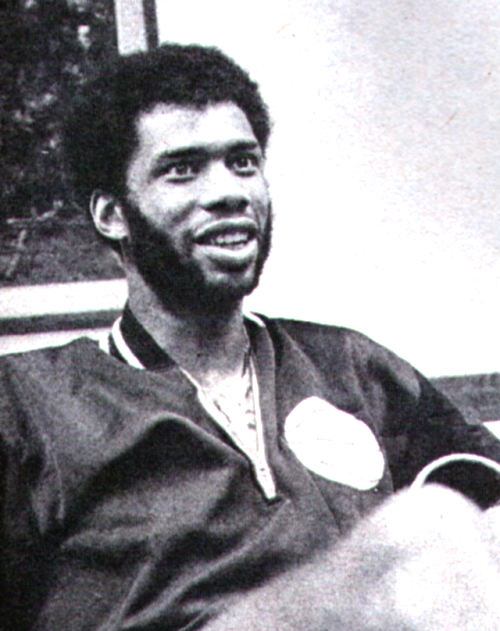
An innocuous recreation center in Inglewood, California, looked placid enough at first sight. Nothing was out of the ordinary, except perhaps for a parking lot full of Mercedes and Rolls Royces – the signature of any given basketball team in the NBA. In this case, it was the Los Angeles Lakers.
Inside the smallish gym there was huffing and puffing, the sound of bouncing basketballs and squeaking tennis shoes. And in the midst of all this easily towering over everything else – stood the man whom prognosticators have knowingly called “the franchise,” Kareem Abdul Jabbar.
A teammate stands at the free throw line, taking careful aim at the basket, and a cut-up practice ritual begins. As the man prepares to shoot, Jabbar flickers a hand to his own head and scratches, his elbow passing within inches of his teammate’s face.
The ball bounces harmlessly off the backboard without even touching the basket. Jabbar breaks into a broad smile and suddenly you wonder what the hell all those sports-writers were talking about when they characterized him as icy, monosyllablic and uncooperative.
The truth of the matter is that Kareem Abdul Jabbar is much more than a dominant force in the high rent jock market, and certainly more than the sports writing fraternity has credited him with. He is a scholar in literature and history, a voracious reader, a jazz fanatic, a dance nut, a former connoisseur of Thunderbird wine, and an eight year student of the martial arts.

“In the summer of 1967, I studied aikido in New York under Yamada sensei,” says Jabbar. “I got interested when I went to see a Zatoichi movie when I was a freshman at UCLA. It was quite impressive to see something like that, to see somebody dealing with violence in that manner. I was raised in New York City, you know. To be raised in New York, you have to know how to fight as a matter of survival – egotistical survival, not really physical survival. Not life or death, but you find that you have to fight just to keep face.”
Kareem’s summer trek back to Southern California in 1967 bore some influential fruit on a much wider scope than the martial arts. He approached the president of BLACK BELT magazine in hopes of finding a local aikido school. Instead, he was introduced to a budding young martial talent by the name of Bruce Lee.
“We shared a lot of the same ideas,” says Kareem. “I think,Bruce was kind of intrigued by the fact that I was an athlete. I had good size and I was in good condition. I could be more than just big and it was a challenge to him to train someone like that. I started training that winter.”
The pair found they had an immediate rapport, not only in the fighting arts, but in mysticism as well. They had read the same books and this led to a number of philosophical discussions about the rights of the common man, Taoism and history.
But most of all, it was jeet kune do and two-hour workouts, three or four times every week. Jabbar learned quickly and received a number of promotions until he had achieved a medium rank in Bruce’s Culver City school.
“Bruce involved boxing, wrestling and everything he saw that was efficient. It upset some people, but it was practical and when he saw something that worked, he used it. He studied JKD to learn how to fight. One thing that Bruce always said was that you can get spiritual enlightenment from doing a lot of things, but there’s no need to bring it into the martial arts.”
When Kareem finally got to use JKD, it was not in a barroom brawl or a struggle beneath the basket, but in a film by Golden Harvest called Game of Death. He played a heavy and had an extended fight scene with Bruce Lee. It was to be Bruce’s last movie.
“Bruce’s death really sent me for a loop, because I was on my way to see him,” Jabbar states. “I was in Singapore, ready to get on a plane. It was really a shock. I sent Linda (Lee’s wife) a telegram and then I went on to Manila. I figured it was best, with all the confusion.”
Bruce Lee’s sudden death hasn’t deterred Jabbar from the martial arts. “The way of the warrior is once he accepts the fact that he is a warrior, he lives it. I have been living it and I keep living it. I know for a fact that Afro Americans in this country have a very long martial tradition. It’s kind of like getting back to it, in a sense.”
But there are other things Jabbar must get back to, namely his wife and his new Los Angeles home. He wades through a modest group of pre-teen autograph seekers.
“What are you driving these days?” asks the writer.
“Oh, just this old dirt wagon,” he replies.
And with that, 7-foot, 4-inch Kareem Abdul Jabbar, shining light of Jack Kent Cooke’s Forum boxoffice, playoff meal ticket of the Lakers for the next half decade, devotee of Islam, philosopher, theosopher and erstwhile student of the Arabic language, wedges into his Mercedes Benz and drives off into the sunset.
